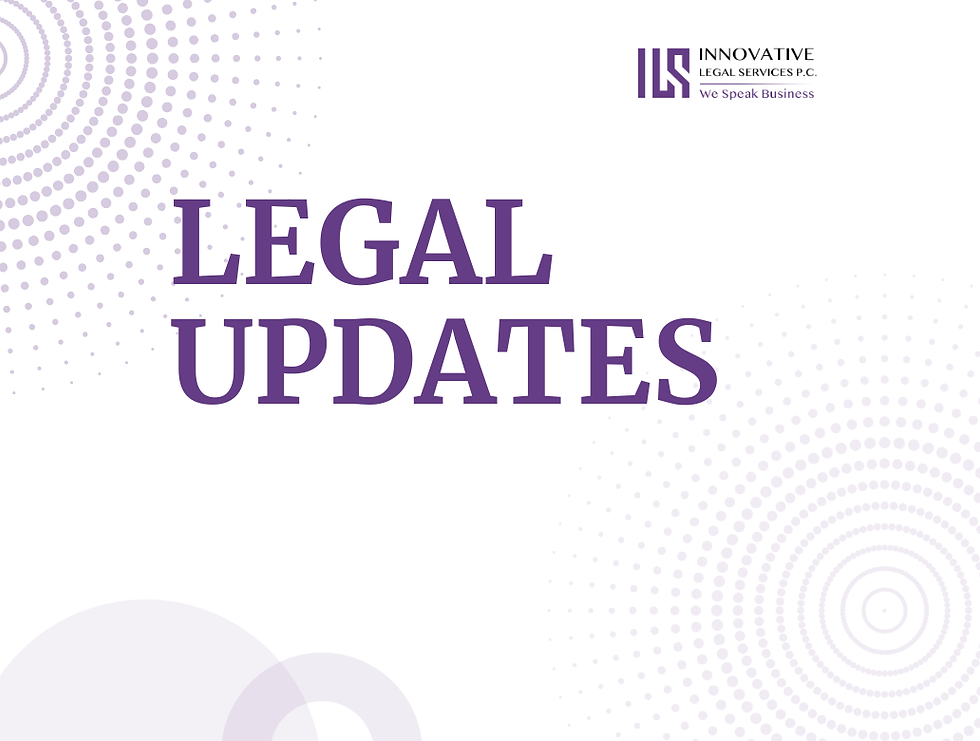California's New Law on Social Compliance Audits: What Employers Need to Know
- Richard Liu
- Sep 26, 2024
- 4 min read
Starting January 1, 2025, California employers will need to pay closer attention to the results of voluntary social compliance audits, especially when child labor practices are involved. Assembly Bill (AB) 3234, signed into law by Governor Gavin Newsom on September 22, 2024, introduces mandatory reporting requirements for employers who choose to undergo these audits. Although these assessments are voluntary, those who opt in must comply with new transparency rules.
For additional information regarding social compliance audits and to find out how this could impact your business, please contact our Managing Partner, Richard Liu, at richard.liu@consultils.com.
What is a Social Compliance Audit?
Under AB 3234, a "social compliance audit" refers to a voluntary, nongovernmental inspection or assessment of a business’s operations to ensure compliance with labor laws, particularly focusing on child labor and health and safety regulations. The legislation applies to any employer voluntarily assessing whether their business is compliant with federal and state labor laws, especially regarding the use of child labor.
While there’s no legal requirement for companies to conduct these audits, businesses that choose to do so must publicly share their findings, increasing transparency regarding labor practices. Here’s what employers need to know to comply with this new law.

Reporting Requirements: What Employers Must Include
When posting the results of a social compliance audit, employers must ensure the report is clearly accessible to the public. AB 3234 requires businesses to provide a link to the audit report on their website in a clear and conspicuous manner, making it easy to locate. This means using larger, contrasting text or symbols to highlight the link.
So, what exactly should the audit report include? Employers must provide the following key details:
Audit Date and Time
The report must specify the exact year, month, day, and time the audit was conducted, and indicate whether it was performed during a day shift or night shift. This ensures transparency about the conditions under which the audit was carried out.
Child Labor Practices
Employers are required to disclose whether they engage in or support the use of child labor. This is critical for demonstrating compliance with both federal and state child labor laws.
Policies and Procedures for Child Employees
A copy of the business’s written policies and procedures regarding the employment of children must be included. This provides insight into the company’s stance on child labor and its internal guidelines for compliance.
Workplace Safety for Child Employees
The audit report should also indicate whether child employees are exposed to hazardous or unsafe conditions that could impact their physical or mental health and development. Employers must provide assurances that the work environment for minors is safe and in compliance with labor regulations.
Work Hours of Child Employees
The report must confirm whether children employed by the business work within regular school hours, outside of school hours, or during the night. This helps verify that the employer is adhering to the legal restrictions on the working hours of minors.
Auditor’s Authority
Finally, the report must include a statement clarifying that the auditing company is not a government agency and does not have the authority to verify compliance with state and federal labor laws or health and safety regulations. This distinguishes the voluntary audit from government-mandated inspections.
Compliance Strategy
Although AB 3234 does not obligate businesses to conduct social compliance audits, companies that choose to do so must ensure they meet the law’s reporting requirements. Failure to comply with these transparency obligations could expose employers to reputational risks and potential legal scrutiny.
To prepare for the January 1, 2025, effective date, employers should consider the following steps:
Assess Whether an Audit is Necessary: Determine whether conducting a voluntary social compliance audit is appropriate for your business. This may depend on factors such as the industry, workforce composition, and the nature of the business’s operations.
Review and Update Labor Policies: Employers should ensure that their policies and procedures related to child labor are up to date and fully compliant with state and federal laws. This includes revisiting internal guidelines on child employment, workplace safety, and working hours for minors.
Prepare for Public Disclosure: If a social compliance audit is conducted, employers must be prepared to post the results on their website in a clear and conspicuous manner. The link to the audit report should be easily accessible, using a larger or contrasting font to ensure visibility.
For additional information regarding social compliance audits and to find out how this could impact your business, please contact our Managing Partner, Richard Liu, at richard.liu@consultils.com.
Disclaimer: The materials provided on this website are for general informational purposes only and do not, and are not intended to, constitute legal advice. You should not act or refrain from acting based on any information provided here. Please consult with your own legal counsel regarding your specific situation and legal questions.

Richard Liu, Esq. is the Managing Counsel of ILS. He serves clients as a management-side defense lawyer specializing in employment and business litigation. Richard is also an expert on litigation prevention and compliance. He regularly advises Fortune 500 companies and startups on employment, labor, and commercial matters.
Email: richard.liu@consultils.com | Phone: 626-344-8949
*Disclaimer: This article does not constitute legal opinion and does not create any attorney-client relationship.

Comments